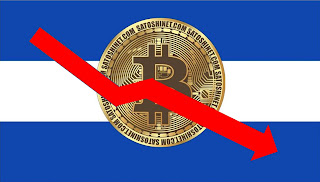Bukele still betting on Bitcoin in 2023
The year 2022 was not the golden year for a Salvadoran Bitcoin economy which El Salvador's president Nayib Bukele had hoped for, but he still includes himself among the crowd of Bitcoin true believers. At the beginning of 2022, Bukele confidently tweeted out his predictions on Bitcoin for the next 12 months:
Bukele missed on every one of those predictions, as Sergio Goschenko writes in this article at Bitcoin.com. Two major trends in 2022 impacted Bukele's Bitcoin gambit for El Salvador -- the collapse in the price of Bitcoin with other crypto-currencies and the refusal of ordinary Salvadorans to adopt Bitcoin in everyday use.
At the end of 2022, the Salvadoran government established a "National Bitcoin Office" whose role is described as overseeing the country's domestic Bitcoin projects. So far, that office seems to primarily be another public relations arm of the government, aggressively cheerleading for the country as a Bitcoin leader. This promotion happens almost exclusively in English -- this is not an activity which the government talks much to its public about.
Digital Securities Law passed
In November 2021, Bukele announced that El Salvador would issue $1 billion of Bitcoin "volcano bonds" which would be used to buy Bitcoin and to construct a futuristic, tax-free "Bitcoin City." Yet those bonds never appeared in 2022. Perhaps (but just perhaps) the volcano bonds may still be on track for issuance some time in the future. On Wednesday, January 11, El Salvador's Legislative Assembly passed a Digital Securities Law designed to enable the growth of a financial services industry around crypto-assets in the country. One of the initial goals of the law is to enable the Bukele government to issue the volcano bonds as a digital asset traded on a blockchain rather than relying on traditional global financial exchanges where government bonds have historically been issued and traded.
Al Jazeera summarized provisions of the law:
“The purpose of this law is to establish the legal framework that grants legal certainty to transfer operations to any title of digital assets used in public issuance offers,” according to the legislation.Public offerings may be made by issuers using existing digital assets, with the opportunity to create new ones through them, the law indicates.The law also establishes the creation of the National Commission for Digital Assets and the Bitcoin Funds Administration Agency, which will be in charge of managing, safeguarding, and investing the funds from public offerings of digital assets carried out by the government.
While Bukele cheered (in English) on Twitter about the passage of this law, he has long since stopped promoting Bitcoin as a currency for daily use in El Salvador. He reads the public opinion polls which show sizable majorities of the public still firmly against making Bitcoin part of their daily economic life.
And as we start 2023, there is no evidence of volcano-powered Bitcoin mining operations generating revenues for the country.
Bukele's Bitcoin investments tumbled
Investing in Bitcoin was only losing money for El Salvador in 2022. Using today's prices, and assuming El Salvador actually purchased Bitcoin at the times and amounts listed in Bukele tweets, the country has unrealized losses of $60 million on purchases of $103 million, or a 58.3% decline in value.
(On November 16, 2022, Bukele tweeted that El Salvador would begin buying one Bitcoin per day, but those purchases, if they took place, are not included in the chart above. And because the government issues no reports or financial statements related to its Bitcoin transactions, it's not possible to say with any confidence that any of the chart reflects reality).
Government's Chivo Wallet fiasco
Blame for the failure of the government's Chivo Bitcoin wallet to gain acceptance among the public lays squarely at Bukele's feet. Recent investigative reports have described how Bukele's push to launch the digital wallet application, and make Bitcoin legal tender only 90 days after announcing the initiative at a Bitcoin conference in Miami, resulted in a buggy, insecure application being launched, resulting in identity theft, fake accounts, and missing funds. You can read more here:
All three of these articles are largely based on the transcript of the deposition of a software consultant named Shaun Overton, given in a lawsuit in a US federal court in Texas. Overton was brought in to help rectify the mess existing in Chivo's opening days and hours, and gave this testimony in the suit with the original developer in charge of the project, Athena.
More recently, a programming bug in the Bitcoin system let users withdraw/steal tens of thousands of dollars which were not actually in their accounts, as described in this reporting at Revista Factum.
Although the initial problems with the Chivo wallet appear to have been fixed, the possibility of creating trust in the minds of most Salvadorans seems remote.
One of the benefits of Bitcoin touted by Bukele and fellow Bitcoin enthusiasts back in 2021 was lowering the cost of sending remittances without needing to use a money transfer company like Western Union. However Salvadorans abroad are not sending money home in the form of crypto in significant quantities. At the beginning of 2023, Salvadorans are making little use of Bitcoin and the Chivo wallet app to send remittances. According to the country’s Central Reserve Bank, only 1.66% of remittances sent to the country during from January to November 2022 were delivered via cryptocurrency.
What's next
The year 2022 was a year of failures and bankruptcies and the exposure of massive frauds in the crypto-universe worldwide. As the likelihood of regulation and scrutiny increases in other jurisdictions around the world, in 2023 the Salvadoran government is saying in English -- "come open your crypto operations here, receive Salvadoran citizenship, be free of taxes, and expect a friendly regulator." What could possibly go wrong?
Next in our series on the status of El Salvador at the beginning of 2023 -- migration



Comments